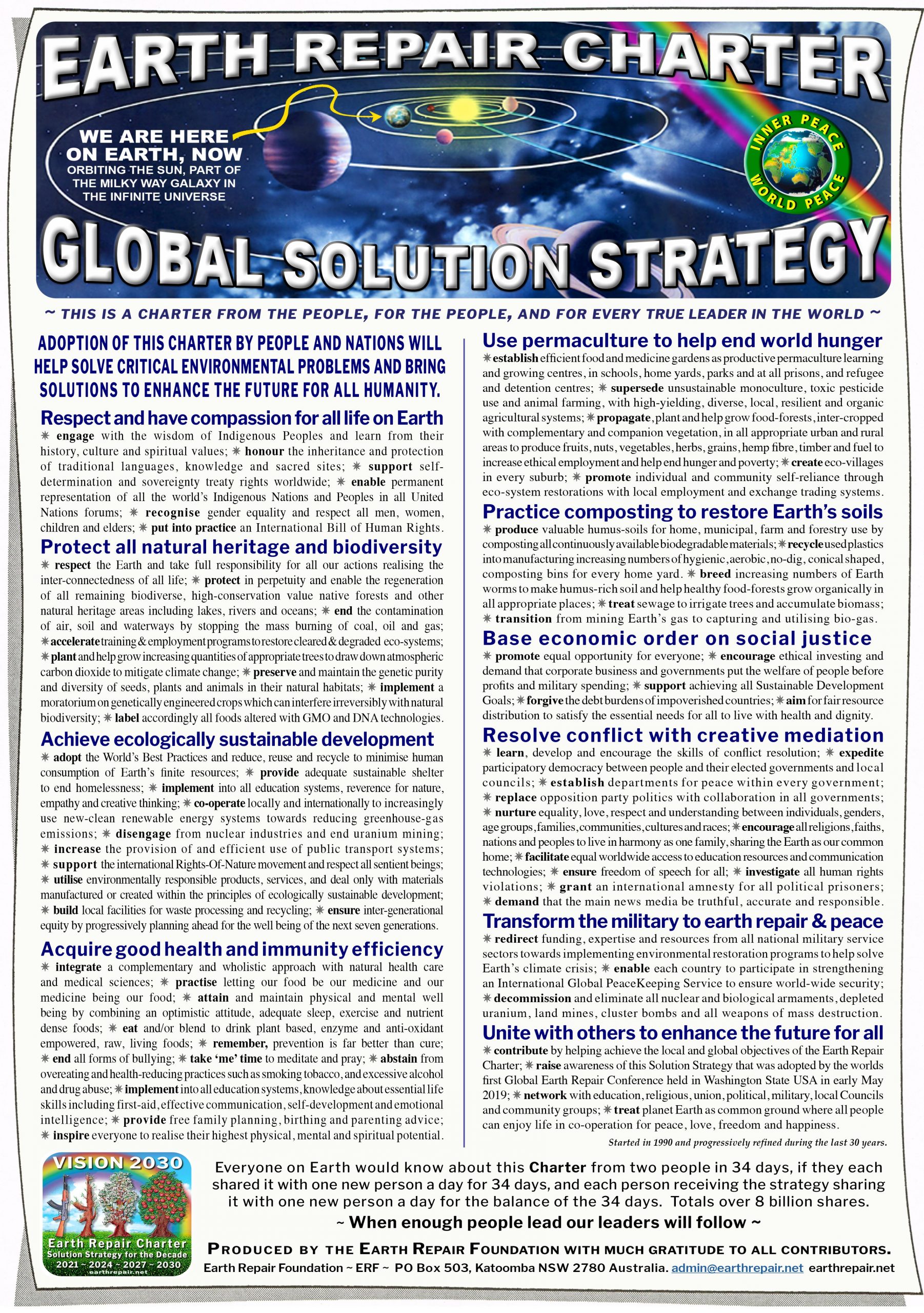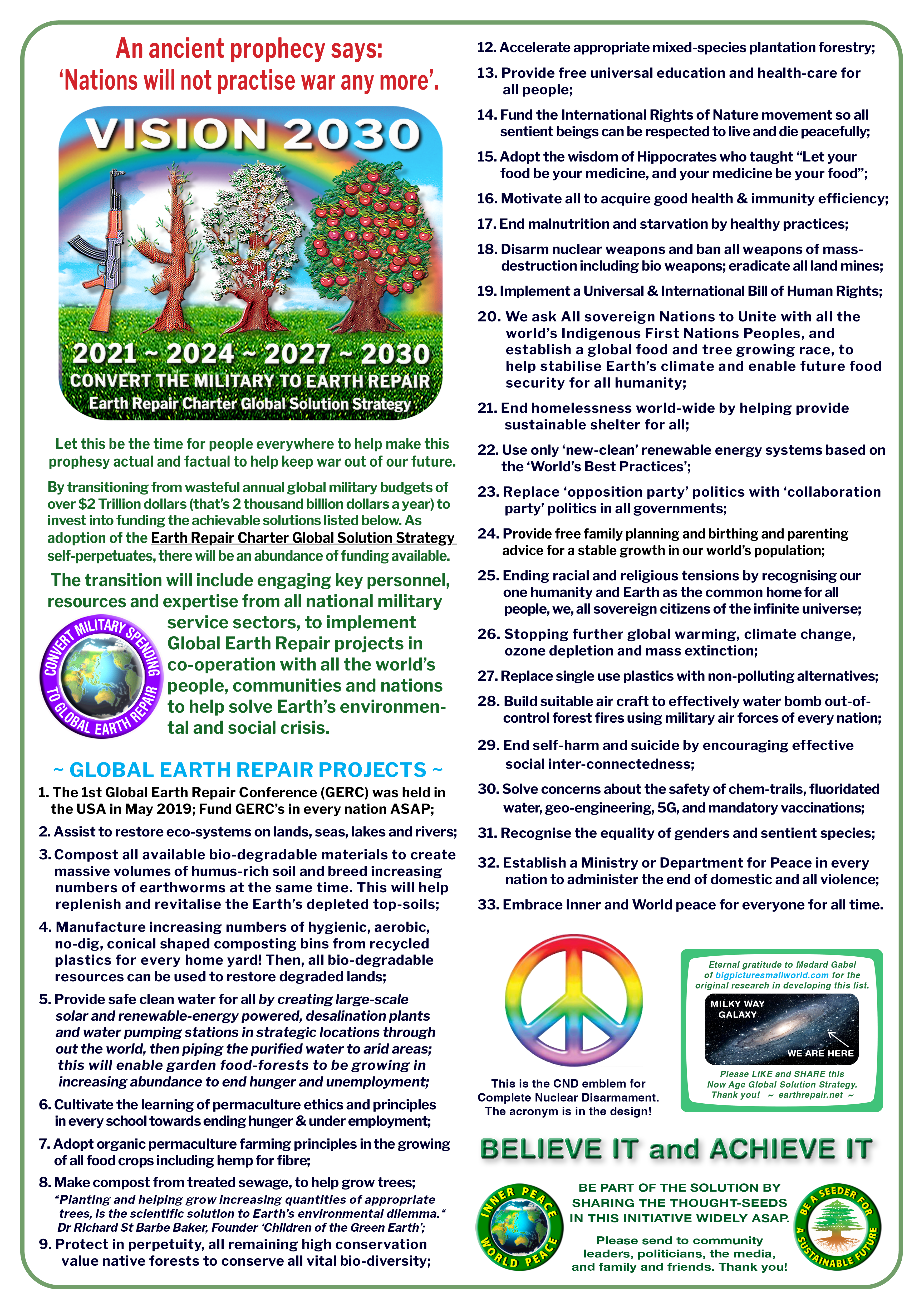Vision 2030: Cultivating Sustainable Abundance through Urban Food Forests
2021: Laying the Permaculture Foundation
In 2021, we find ourselves at the dawn of a transformative era, where our collective vision is directed towards a future that embraces sustainable agriculture and the nurturing power of urban food forests. Our journey begins with the understanding that by shifting our focus from military spending to permaculture practices, we can create thriving ecosystems within urban landscapes that provide abundant food while fostering environmental balance. It is time to lay the foundation for a regenerative world that harmonizes with nature and cultivates sustenance for all.
2024: Cultivating Sustainability through Urban Food Forests
Fast forward to 2024, and we witness a global awakening to the potential of sustainable agriculture and the immense benefits of urban food forests. The ethos of permaculture has taken root, driving the transformation of military expenditures into a force that cultivates abundance in urban settings. Governments and communities worldwide are embracing the concept of urban food forests, integrating them into cityscapes, revitalizing vacant spaces, and empowering local communities to become stewards of their own sustenance. As we cultivate sustainability through these biodiverse and resilient urban ecosystems, we pave the way for a future where food security and ecological harmony coexist within our cities.
2027: Thriving with Urban Food Forest Communities
By 2027, the influence of permaculture and urban food forests has blossomed, giving rise to thriving communities interconnected through a shared commitment to regenerative practices. Urban food forests have become a cornerstone of sustainable agriculture, not only providing nourishment but also restoring neglected urban areas, enhancing biodiversity, and mitigating the impacts of climate change within our cities. These vibrant and diverse urban ecosystems foster resilience, enabling communities to thrive amidst the challenges of urban life. As we harvest the fruits of our collective efforts, we witness the power of urban food forest communities to sustain and nourish us, both physically and spiritually, while transforming our cities into thriving and sustainable oases.
2030: Abundance through Regenerative Urban Food Forests
In the year 2030, we stand in awe of the transformative power of regenerative urban food forests. Our commitment to permaculture and sustainable agriculture has yielded bountiful results, creating a global tapestry of interconnected urban food forest ecosystems. These abundant landscapes within our cities harmonize with nature, producing a diverse array of crops while nurturing the soil, improving air quality, and promoting ecological balance. Through the regeneration of our urban spaces, we have unlocked a future where food security is no longer a distant dream but a tangible reality for all, even within the confines of bustling cities. Our shared vision of abundance through regenerative urban food forests has become a beacon of hope, inspiring generations to come and transforming our cities into vibrant, sustainable, and livable spaces.
The journey from 2021 to 2030 represents a remarkable transformation in our approach to sustenance and environmental stewardship within urban environments. By embracing permaculture principles and prioritizing the development of sustainable urban food forests, we can cultivate abundance while revitalizing our cities and restoring the delicate balance of our planet. Let us join hands in fostering a world where permaculture and urban food forests become the pillars of a resilient and nourishing future for humanity and our urban landscapes.
Harnessing Permaculture for Global Sustainability: From Arms Race to Food and Tree Growing Race
In a world gripped by conflict and climate uncertainty, there lies an opportunity for transformative change. Imagine a future where the race for power and dominance is replaced by a collective pursuit of nourishment and ecological harmony. By embracing permaculture principles and ethics, we have the potential to shift the trajectory of our planet, foster climate action, and ensure permanent food security for all future generations. In this blog post, we will explore how redirecting our resources from the arms race to a global food and tree growing race can bring tangible benefits, from reducing wars and conflicts to directly improving the lives of individuals like you.
Changing the Paradigm: Arms Race to Food and Tree Growing Race
The concept of an arms race has long fueled geopolitical tensions and strained international relations. However, by redirecting our collective focus towards a global food and tree growing race, we can usher in a new era of cooperation and sustainability. Instead of investing trillions of dollars into weaponry and defense, imagine channeling those resources into permaculture practices, where the principles of Earth care, people care, and fair share guide our actions. By adopting regenerative approaches to agriculture and nurturing diverse food and tree ecosystems, we can foster a world that thrives on abundance, compassion, and ecological interdependence while taking significant climate action.
Proven Benefits: Less Wars, Increased Stability
- Conflict Resolution: By shifting our priorities towards food and tree growing, we diminish the incentives for conflict and aggression that often arise from resource scarcity and competition. As communities become more self-sufficient through permaculture-based practices, tensions over limited resources are alleviated, leading to reduced instances of wars and conflicts. This shift contributes to climate action by redirecting resources towards sustainable practices rather than destructive military endeavors.
- Peacebuilding: Emphasizing food security and ecological stewardship creates a common ground for collaboration among nations. The shared goal of ensuring sustainable nourishment and climate stability encourages diplomacy, cooperation, and the pursuit of peaceful resolutions. By fostering dialogue and cooperation through permaculture practices, we can build a more peaceful and interconnected global community, working hand in hand to tackle the pressing climate challenges we face.
- Resource Redistribution: The global food and tree growing race offers an opportunity to address inequalities and inequities in resource distribution. Permaculture’s focus on fair share encourages the redistribution of resources, ensuring that the benefits of sustainable agriculture and tree growing reach all individuals, regardless of their socioeconomic status. This equitable distribution promotes social justice and empowers individuals to take climate action within their communities, fostering a sense of ownership and shared responsibility.
Stabilizing Earth’s Climate: A Path to Permanent Food Security
One of the greatest challenges of our time is the destabilization of Earth’s climate, resulting in unpredictable weather patterns and threats to food production. Through permaculture practices and the global pursuit of food and tree growing, we have the means to mitigate climate change and ensure long-term food security for future generations. By regenerating ecosystems, sequestering carbon, and nurturing resilient food forests, we can create a positive feedback loop that stabilizes the climate and nurtures the abundance required for permanent food security while driving significant climate action.
Proven Benefits: Climate Change Reduction, Individual Prosperity
- Carbon Sequestration: Permaculture-based food and tree growing systems have the inherent ability to sequester carbon dioxide from the atmosphere, mitigating the greenhouse effect and reducing the impacts of climate change. By adopting these practices on a global scale, we can significantly contribute to the reduction of carbon emissions, helping to stabilize the Earth’s climate and safeguarding the future of our planet. This climate action creates a sustainable environment for future generations
, ensuring their well-being and prosperity.
- Resilient Food Systems: Permaculture principles empower individuals and communities to create resilient food systems that adapt to changing climates. By diversifying crops, implementing water conservation techniques, and nurturing regenerative landscapes, we increase the capacity to produce food even in challenging conditions. These climate-resilient food systems ensure a steady food supply for individuals and communities, contributing to their prosperity and well-being amidst changing climatic circumstances.
- Individual Prosperity: Embracing permaculture and participating in the global food and tree growing race not only benefits the planet but also directly enhances the lives of individuals. By cultivating food forests and sustainable agricultural practices, individuals gain access to fresh, nutritious produce, reducing dependency on industrial food systems. Additionally, the development of local food economies and community-based initiatives creates opportunities for entrepreneurship, job creation, and economic prosperity at the individual level. This climate action not only secures the future of our planet but also directly improves the quality of life for individuals like you.
Embracing a Brighter Future
As we embark on the journey from an arms race to a global food and tree growing race, the benefits are manifold. By shifting our priorities towards permaculture practices, we can foster peace, stability, and climate action on a global scale. Moreover, the adoption of sustainable agriculture and the pursuit of food security empower individuals, granting them access to fresh food, economic opportunities, and a sense of purpose in caring for the Earth.
By embracing permaculture and actively participating in the global food and tree growing race, you can play an essential role in creating a more sustainable and abundant future. Whether you start by tending to a small urban food forest in your backyard or advocating for policy changes that prioritize regenerative practices, every action counts. Together, let us sow the seeds of change, cultivate climate action, and a world where peace, prosperity, and ecological harmony thrive.



